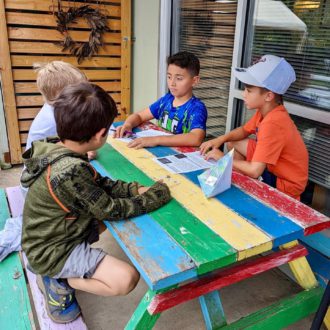In July 1991, educators from Asheville, Haywood County and other districts traveled to Hendersonville on a fact-finding mission. Bruce Drysdale Elementary and Hendersonville Middle had just become the first public schools in Western North Carolina to offer year-round schedules, and the officials wanted to see what all the fuss was about.
Bruce Drysdale Principal Noland Ramsey told the visiting educators about the nascent program and offered a prediction. “We already feel like — for teachers, parents and students — we may reach the day when we have to weigh the advantages of keeping the traditional year program,” he said, according to the Asheville Citizen-Times.
Ramsey’s sentiment was a common one at the time. Many viewed the traditional school calendar, with its 12-week summer break, as a relic of a bygone agrarian era that was out of step with modern life. And education experts believed a so-called year-round schedule — a quarterly system with shorter, periodic vacations and enrichment programs — would help stem learning loss students suffered over the long summer break.
And for a few years, it looked as if year-round school might indeed be the future of education.
Starting in 1993, schools in Asheville, Buncombe County and Haywood County experimented with the concept. Buncombe County tried a flex schedule at Black Mountain Primary and Elementary schools for a few years in the 1990s. Asheville’s Hall Fletcher Elementary operated year-round from 1993-98 and again from 2014-17. Haywood County’s Meadowbrook Elementary School had a year-round schedule for nearly two decades, from 1997 to 2016.
The programs proved popular with many parents, but the districts cited higher costs and logistical difficulties associated with operating two separate schedules as reasons for scrapping them. “Resources can be more efficiently managed when the whole district is on the same calendar,” says Asheville City Schools spokesman Dillon Huffman.
And studies are inconclusive if year-round schools boost learning.
“There just hasn’t been any rigorous research that has ever shown that year-round schools are [more] effective or that year-round schools help students have higher achievement scores,” explains Myra Watson, an assistant professor and director of teacher and professional education at Western Carolina University. “I think the whole theory of summer learning loss hasn’t really panned out. It kind of evens out because year-round schools are not extended calendar schools. Kids in year-round schools go to school the same amount of days as kids on a traditional school calendar.”
All schools in North Carolina are required to have at least 185 days of instruction.
So, 32 years after year-round education came to the mountains, the situation is back to where it was in 1991: Two schools in Hendersonville offer optional year-round schedules for about 780 students, while no other districts in Xpress‘ coverage area have such programs. And even Bruce Drysdale abandoned the idea for more than a decade before reviving it in 2009.
Watson says a year-round schedule presents challenges for parents with more than one child.
“Typically, they’re elementary schools, and so it’s fine when a family’s first kid goes through,” says Watson, who taught at Meadowbrook Elementary when it was on a year-round schedule. “But then when that first kid goes to middle school or is in high school and you still have elementary-school-aged kids on a schedule that differs from the schedule of the rest of the family, it becomes a child care issue, [and] taking vacations as a family becomes more difficult.”
Middle schools and high schools are less likely to adopt flexible schedules for a variety of reasons, including the difficulty of students participating in sports whose seasons are geared to the state’s traditional calendar. Another problem, Watson says, is that many high schoolers these days take dual enrollment classes at local colleges.
Lifestyle choice
Yet year-round school remains a niche option that tends to appeal most to more affluent parents.
Anthony Johnson is principal of Mountain Community School, a kindergarten-to-eighth-grade public charter school in Hendersonville that operates on a flex schedule. He thinks the popularity of summer camps is another reason year-round school has proved to be a hard sell to parents in Western North Carolina.
“I’m originally from Florida, and when I moved up here in 2015, I came to learn that the summer camps run the show in the mountains,” he says. “Because they often go so late into the summer, that’s a big reason why a lot of the traditional schools were sticking to their schedules. We do have some issues where a couple of our students start the school year off at summer camp.”

But despite logistical issues, Johnson is a proponent of year-round schooling. He spent more than a decade as an educator at schools running on traditional schedules before taking the Mountain Community job last year. He wasn’t sure what to expect at first, but now he says: “I can’t go back because of how great of a schedule it really is.”
Johnson says a break after nine weeks, when students and teachers are starting to get frazzled, allows everybody time to decompress. That’s not the case under a traditional calendar.
“Everything is just shut down. We’re quiet,” he says. “We’re still reaching out [to students] if we need to, but we’re at least able to breathe that sigh of relief.”
Watson says year-round programs tend to favor privileged parents who can easily provide transportation and arrange child care and have flexible schedules. When she taught at Canton’s Meadowbrook Elementary, which was year-round at the time, she says many of the parents worked blue-collar jobs at the town’s Pactiv-Evergreen paper mill.
“Not everybody has flexibility to take a vacation at the end of September,” she points out. “Some people get one week of vacation a year or maybe no paid vacation at all.”
Watson likens year-round programs to charter schools, which she says similarly tend to benefit more affluent parents.
“It can be a great option for some people, but for a lot of people, it just doesn’t meet the needs of a truly free and public education that’s accessible to everyone,” she says.
Minding the gap
Last week, 449 students returned to Bruce Drysdale, and 332 returned to Hendersonville Elementary to begin the 2023-24 school year. Bruce Drysdale serves students who live in the school’s downtown Hendersonville district but also operates a lottery-based Spanish dual language program that is open to students from throughout the county.
Hendersonville Elementary, which has a STEM focus, is open to students living anywhere in the county. Parents must enter a lottery for a chance to enroll their children.
At both K-5 schools, transportation is provided only to students living in the Bruce Drysdale Elementary school district.
Shannon Marlowe, Henderson County’s assistant superintendent for instructional services, agrees with Watson that research about summer learning loss is not conclusive and can be contradictory. Still, she sees definite benefits to year-round learning.
“The ‘summer slide’ can be observed by classroom teachers when [students] return to school and are reintroduced to learning practices and routines,” she says. “The learning may not actually be gone, but the less time students are out of their learning routines, the less time it takes to get back in the swing of things and to recall past learning.”
That sentiment is echoed by many parents and teachers at the two schools, which operate on a nine-week quarter system with breaks of about three weeks in between. And they say the schedule has other advantages.
“As a parent, I loved that my kids were at school learning pretty much all year with a short summer break to keep them engaged and not losing the information and knowledge they gained throughout the school year,” says Kim Wood, who had three children go through Hendersonville Elementary. “Also, with a shorter summer break, there is less time for them to become bored. You are not having to find camps [and] child care to keep them entertained.”
Shianne Bryan, who has a son at Hendersonville Elementary and a daughter entering Hendersonville High, says the shorter summer break can make vacation plans difficult. “But I feel like education is much more important than stuff like that. My youngest has a little bit more time to get back into school and get back into the groove of things without losing as much information.”
Susan Newman taught at both schools, and her daughter attended Bruce Drysdale.
“It stinks going back to school in July when everybody else is off,” she admits. “That part really was bad. But you go for nine weeks, and then you’re out in September for three weeks, and that’s an awesome time to be off. As a parent and a teacher, I loved that.”
Richard Cagle, a Bruce Drysdale teacher with two kids at the school, has similar thoughts.
“I can go on vacation when everybody else is in school, and there’s not all these crowds at Disney or Dollywood or wherever we’re going,” he says. “I can go in the middle of September.”
The schedule does have some drawbacks, particularly in the dead of summer, teachers and parents say.
“It was an adjustment when my kids returned from break in July,” Wood says. “Most of our neighbors go to a different school, so the struggle was with going back to an early bedtime and allowing time after school for any homework when the neighbors had more freedom.”
And Cagle says the weather in late July and early August can be a challenge, even in air-conditioned schools. “The only disadvantage is when it’s superhot. Fortunately, I’m in a portable unit, and I can control the air in my room.”




The agricultural driven education calendar we live with even though 99+% of people aren’t on farms is clearly inferior to models in much of the world. 3 months on and one off produces much better results. Why don’t we do that? My guess is because teachers like that big break.